【2013中考夺分】新目标英语七年级下册
文档属性
| 名称 | 【2013中考夺分】新目标英语七年级下册 |  | |
| 格式 | zip | ||
| 文件大小 | 600.8KB | ||
| 资源类型 | 教案 | ||
| 版本资源 | 通用版 | ||
| 科目 | 英语 | ||
| 更新时间 | 2013-03-17 14:55:40 | ||
图片预览

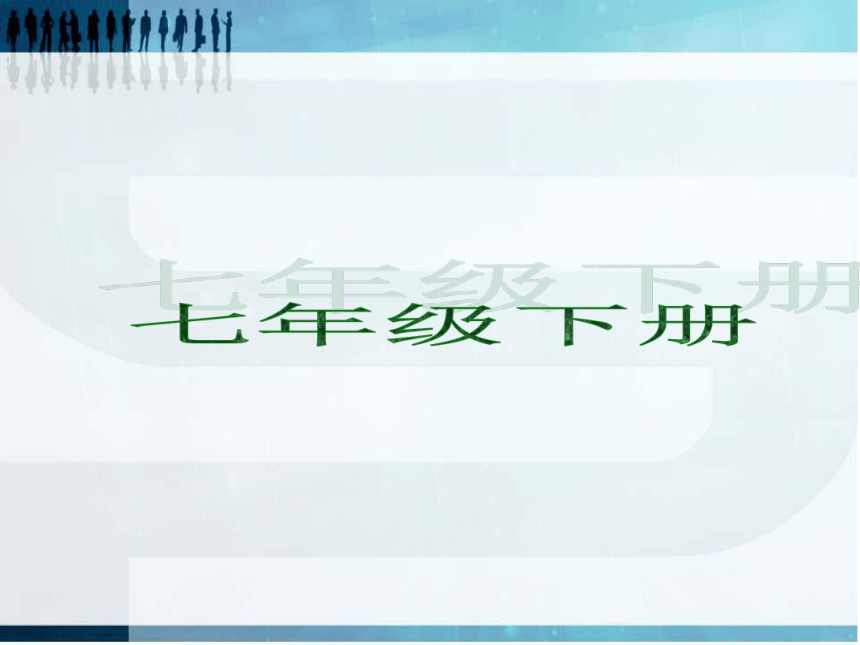
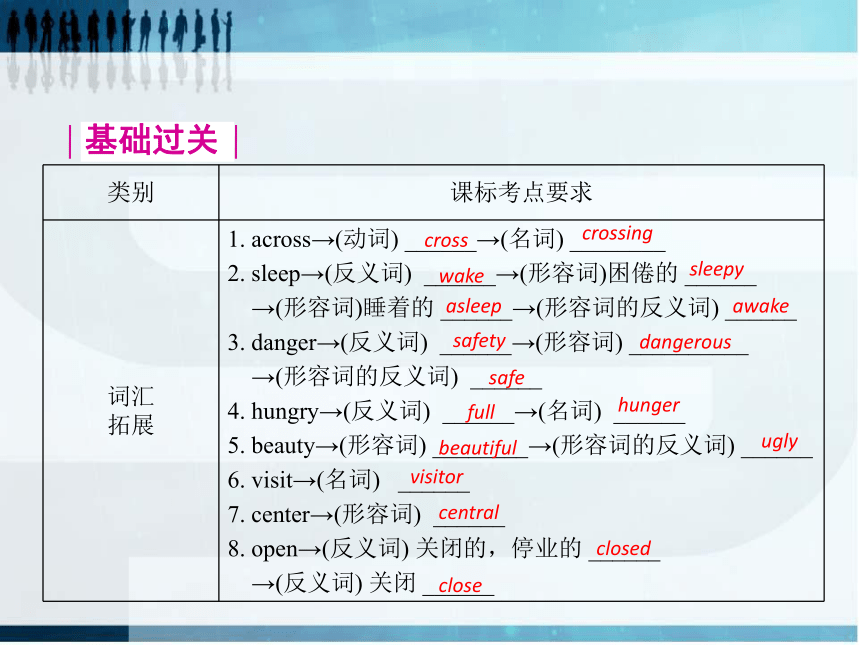
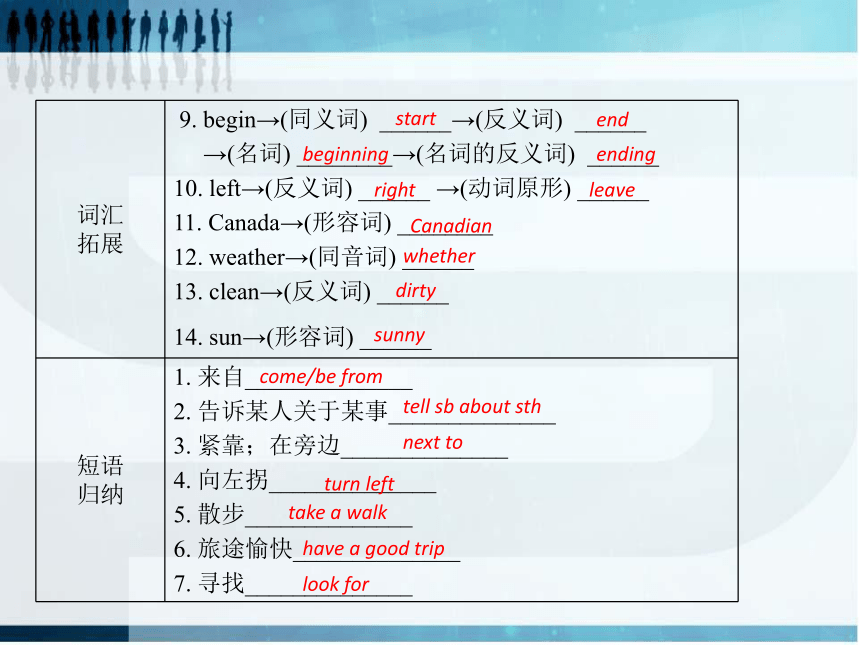
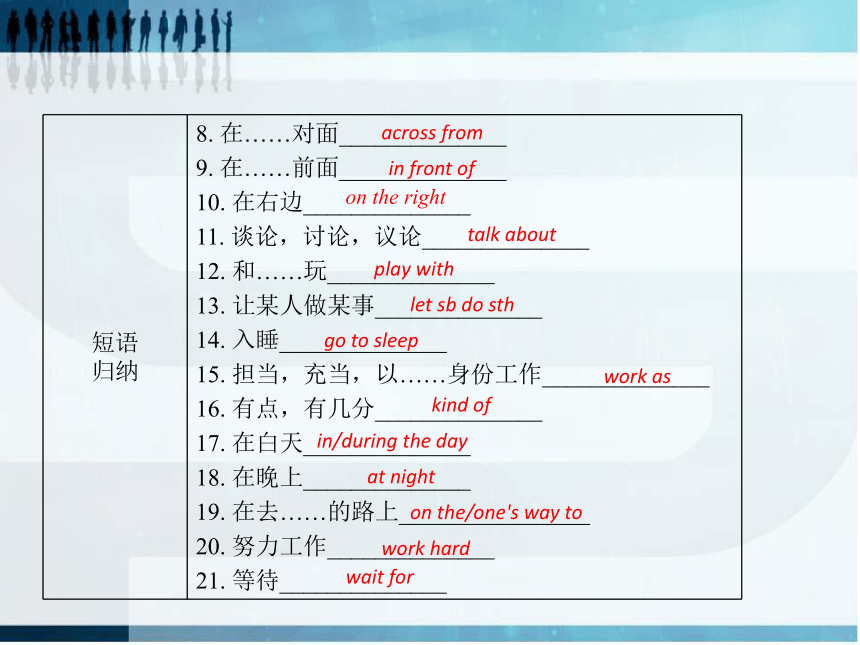
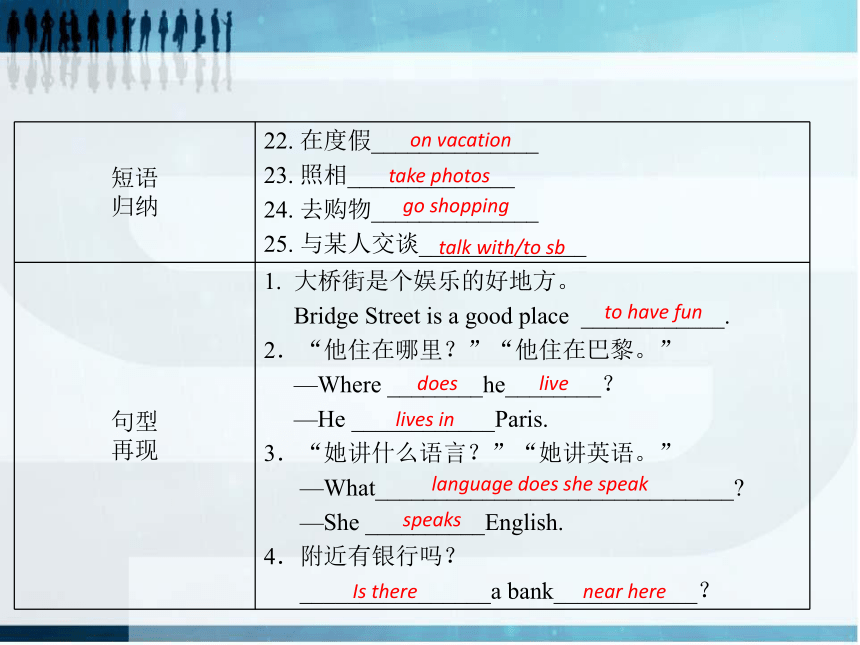
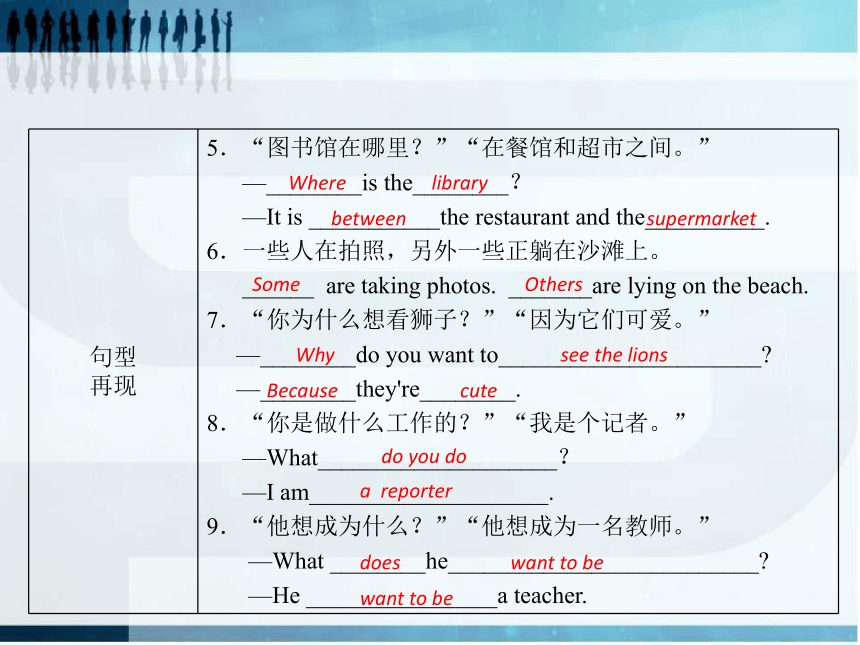
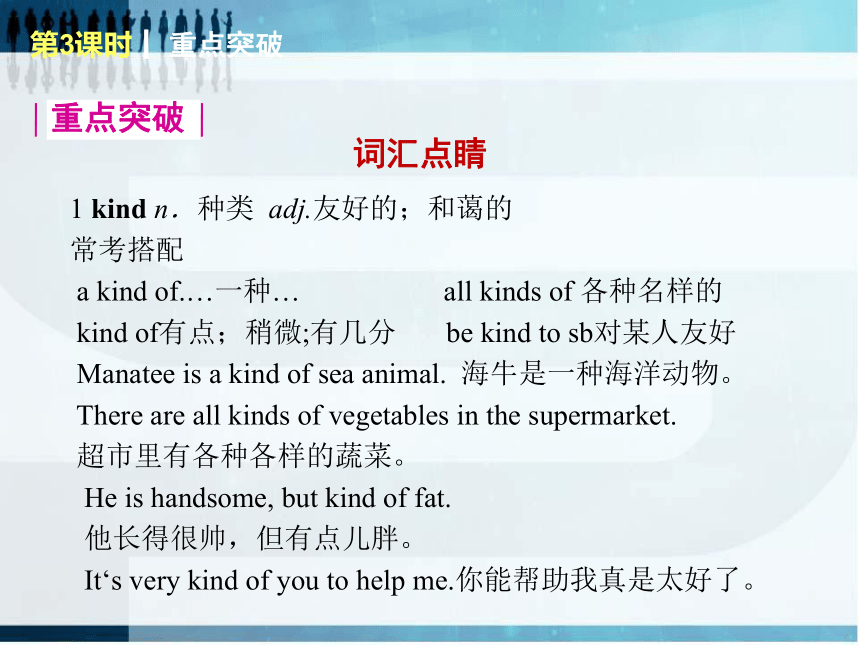
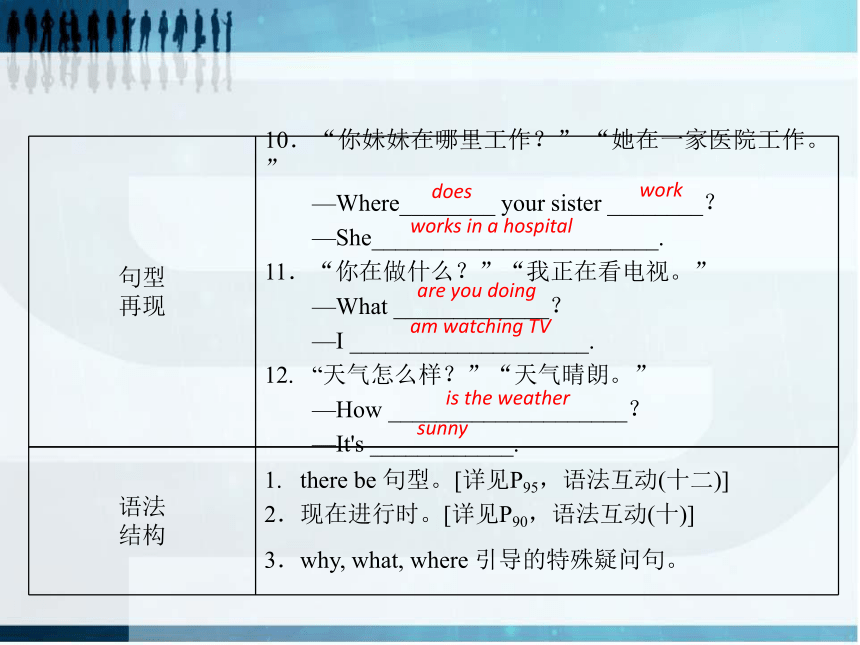
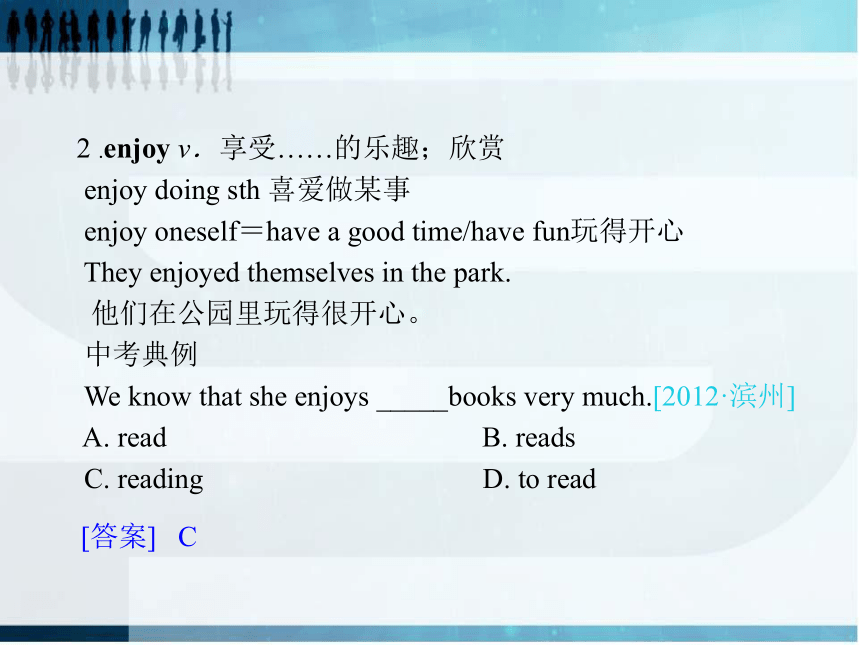
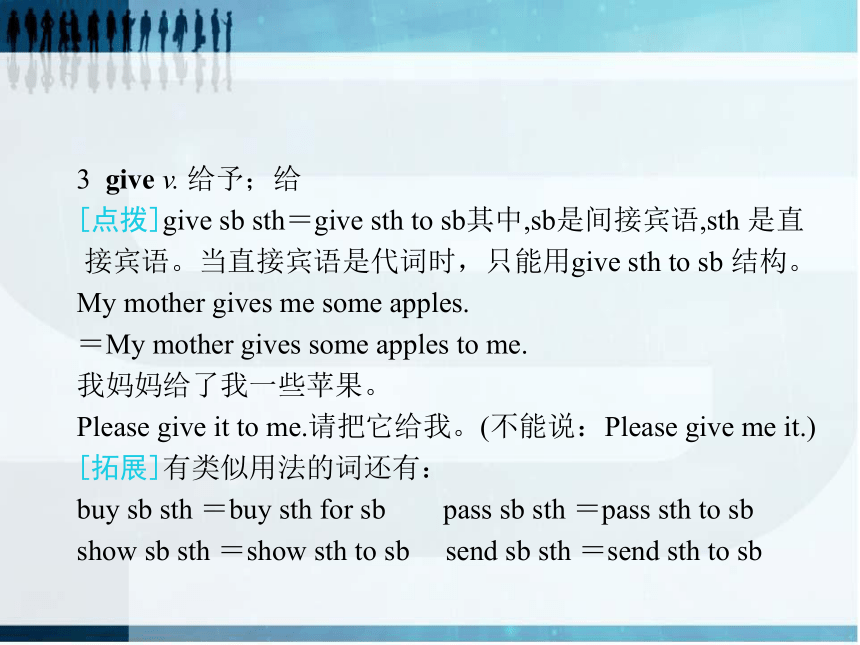
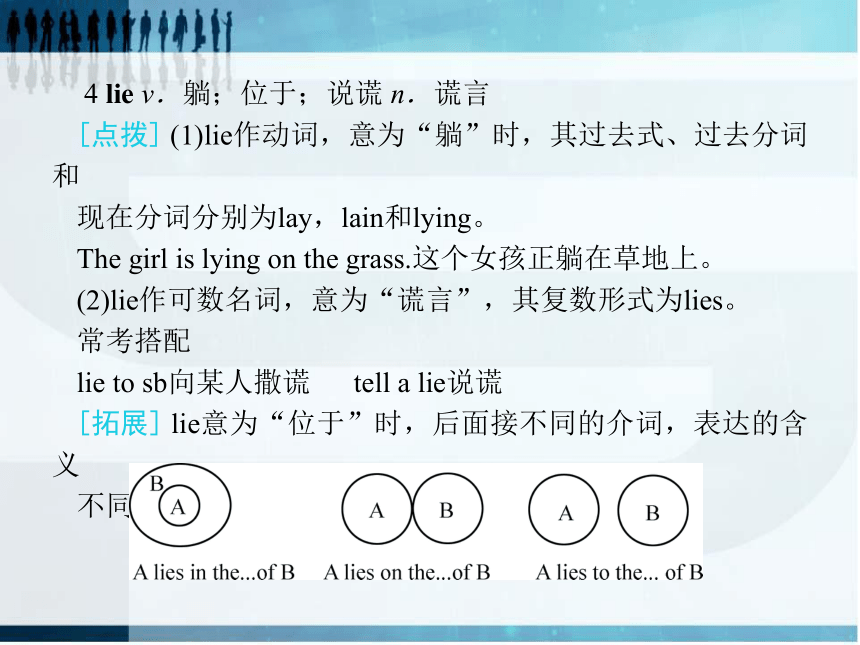
文档简介
课件62张PPT。七年级下册cross crossing wake asleep sleepy awake safety dangerous safe full hunger beautiful ugly visitor central closed close Canadian whether dirty sunny come/be from tell sb about sth next toturn left take a walk have a good trip start end beginning ending right leave look for across from in front of talk about play with let sb do sth go to sleep work as kind of in/during the day at night on the/one's way to work hard wait for on the righton vacation take photos go shopping talk with/to sb to have fun does live lives in language does she speak speaks Is there near hereWhere library between supermarket Some Others Why see the lions Because cute do you do a reporter does want to be want to be 词汇点睛1 kind n.种类 adj.友好的;和蔼的
常考搭配
a kind of.…一种… all kinds of 各种名样的
kind of有点;稍微;有几分 be kind to sb对某人友好
Manatee is a kind of sea animal. 海牛是一种海洋动物。
There are all kinds of vegetables in the supermarket.
超市里有各种各样的蔬菜。
He is handsome, but kind of fat.
他长得很帅,但有点儿胖。
It‘s very kind of you to help me.你能帮助我真是太好了。第3课时┃ 重点突破does work works in a hospital are you doing am watching TV is the weather sunny
2 .enjoy v.享受……的乐趣;欣赏
enjoy doing sth 喜爱做某事
enjoy oneself=have a good time/have fun玩得开心
They enjoyed themselves in the park.
他们在公园里玩得很开心。
中考典例
We know that she enjoys _____books very much.[2012·滨州]
A. read B. reads
C. reading D. to read
[答案] C3 give v. 给予;给
[点拨]give sb sth=give sth to sb其中,sb是间接宾语,sth 是直
接宾语。当直接宾语是代词时,只能用give sth to sb 结构。
My mother gives me some apples.
=My mother gives some apples to me.
我妈妈给了我一些苹果。
Please give it to me.请把它给我。(不能说:Please give me it.)
[拓展]有类似用法的词还有:
buy sb sth =buy sth for sb pass sb sth =pass sth to sb
show sb sth =show sth to sb send sb sth =send sth to sb1 house/home/family
(1)house意为“房子”,指居住的建筑物。
(2)home意为“家”,指一家人共同并经常居住的地方,含有“家乡、故乡”的意思,它具有house所没有的感彩(如团聚、思念等)。
(3)family作整体概念的“家庭”讲时,看作单数;作“家庭成员”
讲时,看作复数。
There are many new houses in our village.
我们村里有许多新房子。
East or west, home is the best.金窝银窝不如自己的草窝。
Mr Richard's family is very large.理查德家里的人很多。(单数)
My family are very well.我家里人身体都很好。(复数)第3课时┃ 重点突破巧辨异同2 across/through/over/past/cross
(1)across为介词,表示“从……表面穿过”或者“横穿”,指从
某个范围的一边到另一边。across from意为“在……对面”。
He can swim across the river.他能游过这条河。
(2)through为介词,表示“从……中间穿过”,往往指穿过沙
漠、森林,(光线)透过窗户等。
The river runs through the city.这条河从这座城市中间流过。
(3)over为介词,意为“翻越”,表示到达高的障碍物(如树、
墙、篱笆和山脉等)的另一侧。
He jumped over the wall. 他跳过了墙。
(4)past为介词,意为“走过,经过”,指从某物或某人旁边经
过。walk/go past=pass。第3课时┃ 重点突破第3课时┃ 重点突破 [解析] D “穿越隧道”用介词through。第3课时┃ 重点突破3 wear/put on/dress/in/第3课时┃ 重点突破中考典例
Most British high school children_____ uniforms at school.
[2011.济宁]
A. wear B. dress C. put on D. dress up [解析] A 由句意“大多数英国中学生在学校穿校服”可知是
强调穿的状态,故用wear。 4 between/among
(1)between 一般指两者之间,常与and连用。
(2)among一般用于三者或三者以上的人或物之间。
Our teacher is standing among the students.
我们的老师正站在学生中间。
中考典例
The accident happened____7 p m____9 p m.[2012·呼和浩特]
A. from; to B. between; to
C. from; and D. between; and第3课时┃ 重点突破[解析] D 句意:事故发生在下午7点至9点之间。5 in front of/in the front of
(1)in front of 指在某个范围外部的前面。
(2)in the front of 指在某个范围内的前面。
He took a seat in the front of the cinema.
他在电影院前排位置坐下了。
中考典例
—Why are you standing, Alice?
—I can‘t see the blackboard clearly. Two tall boys are sitting
_____me.[ 2012.广东]
A. behind B. next to C. between D. in front of第3课时┃ 重点突破[解析] D 由“I can’t see the blackboard clearly.”可知“两个高个子男孩坐在我的前面”。1 This is my new pen pal. She's from Australia.
这是我的新笔友。她来自澳大利亚。
[点拨] be from意为“来自于, 是……地方的人”,与come
from同义。
[句型] 询问“某人来自某地”的两个句型:
Where+be + 主语 + from?
Where+do/does + 主语+come from?第3课时┃ 重点突破句型透视2 Isn't he cute?难道他不可爱吗?
[点拨] 一般疑问句的否定形式叫否定疑问句,意为“难道
不……?”形式上是否定,实际表示肯定意义,表示惊
奇、赞许或责备等。答句中Yes意为“不”;No意为“是
的”。
—Don‘t you know her name? 难道你不知道她的名字吗?
—Yes, I do.不,我知道。
—No, I don‘t.是的,我不知道。
注意:(1)句首的助动词与人称保持一致。
(2)答句中的助动词与问句中的助动词保持一致。
(3)Yes或No的回答要保持前后一致。即:Yes后是肯定形
式;No后是否定形式。第3课时┃ 重点突破3 What do you do?你是做什么工作的?
[句型] 询问某人的职业通常有三种句型:
What +be+主语? What do/does+主语+do?
What's one's job?
[拓展] 英语中的一些职业往往与该职业的活动或工作内容相
关,常在动词的词尾加后缀“er”或“or”构成从事此种职业的
人的名词。
wait—waiter; work—worker; teach—teacher sing—singer;
clean—cleaner; report—reporter write—writer; drive—driver;
dance—dancer; visit—visitor; act—actor; sail—sailor
还有一种是由“名词+ist”构成。violin—violinist;
journal—journalist第3课时┃ 重点突破4 How's the weather in Beijing?
北京的天气怎么样?
[点拨] How‘s the weather? =What’s the weather like? 常用
来询问天气,weather 是不可数名词,不能用a或an修饰。
What fine weather it is!
多好的天气!第3课时┃ 重点突破[拓展] (1)询问天气情况的常用表达方式还有:
What do you think of the weather?
你认为天气怎么样?
—What will the weather be like tomorrow?
明天天气怎么样?
—It'll be very cold, but quite sunny.
天气会很冷,但阳光很好。
(2)常见的描述天气的形容词有:windy 刮风的;sunny 晴
朗的;rainy 下雨的;snowy 下雪的;fine 晴朗的;warm
暖和的;hot 炎热的;humid 湿热的。第3课时┃ 重点突破5 Some are taking photos. Others are lying on the beach.
一些人在拍照,另外一些正躺在沙滩上。
[点拨] Some…others意为“一些……,另一些……”,指除
去一部分之后的另一些,但不是剩余的全部。
There are a lot of people in the park. Some are walking, some
are looking at the flowers, others are boating.
公园里有许多人。有些人在散步,有些人在赏花,另一
些人在划船。
[拓展] (1)Some…the others…意为“一些……,另一
些……”,指除去一部分之后的另一些,指剩余的全部。
Some of them are doctors, the others are teachers.
他们其中一些是医生,剩下的都是老师。第3课时┃ 重点突破(2)one …the other …意为“一个……,(两者中)另一
个……”。
I have two pens. One is red, and the other is white.
我有两支钢笔,一支是红色的,另一支是白色的。
中考典例
We have two foreign teachers here. One is from England,
and ______is from America. [2011·宿迁]
A. another B. the other
C.other D.the others
第3课时┃ 重点突破[解析] B 由“two foreign teachers”可知此空是指“两者中的另一个”,故选B。Ⅰ. 单项填空
1.I ________ a white uniform. He is ________ white, too.
A.wear; in B.wear; wear
C.in; in D.dress; wearing
2.The girl is afraid to speak ________ the whole school.
A.in the front of B.in front of
C.behind D.across from
3.The little girl is sitting ________ her parents.
A.between B.from
C.among D.of第3课时┃ 重点突破 即时自测A B A 4.They walked ________ the forest, and got to another
town at last.
A.through B.across
C.cross D.to
5.—Did you ________ your weekend?
—No, I was not happy because my mother was ill.
A.have B.enjoy
C.relax D.visit第3课时┃ 重点突破A B Ⅱ. 用所给词的适当形式填空
1.There are some ___________ (child) over there.
2.He is ___________ (surprise) to hear the bad news.
3.I love ______________ (scarf), so I often wear them.
4.Zhang Liangying is my favourite pop ________
(sing).
5.—How's the weather today?
—It's ________ (wind). 第3课时┃ 重点突破children surprised scarves/ scarfs singer windy 第4课时|Units 7—12,Book 7B第4课时 Units 7—12,Book 7Bshort height fat thick never forget singer song heavily light rainy decision 第4课时┃ 基础过关agreement disagree cheap inexpensive dearpersonal 第4课时┃ 基础过关look like tell jokes medium height middle school have fun doing sth go for a walk think of/about in fact agree with sb listen to music have to a little bit wear glasses have a new look not…any more/longer on Saturday morning do some reading go to the mountains go to summer camp all day the Great Wall the Children's Palace last weekend 第4课时┃ 基础过关 no talking What does look like medium build has don't think is kind of would you like help you stops talking was 第4课时┃ 基础过关was great time to go home no dog no family did go on vacation fun playing found cryingthink of can't standDon't run decided to play tennis What else 第4课时┃ 基础过关have to clean 第4课时┃ 基础过关词汇点睛1 remember v.记得,记起
[点拨]其反义词为forget,后面可以直接接名词、代词、动词
不定式、动名词或从句。
I still remember what he said to me.
我依然记得他对我说的话。
[搭配]remember/forget to do sth记得/忘记去做某事(表示事情
未做)
remember/forget doing sth 记得/忘记做过某事(表示事情已做)第4课时┃ 重点突破中考典例
Remember ______off the lights when you leave he
classroom.[2012.怀化]
A. turn B. to turn C. turning 第4课时┃ 重点突破[解析] B 由“when you leave the classroom”可知选B。第4课时┃ 重点突破2 make v.使,促使,迫使;写,制定,做
[点拨] make 的常见用法:
(1)make sth表示“做……,制造……”。
They are making dumplings.他们正在包饺子。
(2)make sb +adj./n.表示“使某人……”。
We made Jack our monitor at the meeting yesterday.
在昨天的会议上我们选杰克做班长。
第4课时┃ 重点突破(3)make it +adj.+(for sb) to do sth表示“使某人做某事……”
They improved the software to make it easier for people to use
computers.
他们提高软件性能使人们使用计算机更方便、更容易。
(4)make sb do sth表示“使某人做某事”。
Tom made his sister clean his room yesterday.
昨天汤姆让他的妹妹打扫了他的房间。第4课时┃ 重点突破3 agree v.同意;赞成
常考搭配
agree with sb同意某人(的意
agree to( do) sth同意/答应(做某事)
agree on/upon sth对某事意见一致,达成共识
Do you agree with me about going to Hainan by air?
关于坐飞机去海南的事,你同意我的意见吗?
Are they going to agree to our suggestion?
他们会同意我们的建议吗?第4课时┃ 重点突破巧辨异同1 spend/pay/cost/takecost, spend和pay在一定条件下可相互转换:
The pen cost me three yuan.
=I spent three yuan on the pen.
=I paid three yuan for the pen.
=I bought the pen for three yuan.
这支钢笔花了我三元钱。
中考典例
—The T-shirt looks nice on you How much does it_____?
—I just _______ten dollars for it. [2011 .成都 ]
A. take; afforded B. cost; paid C. cost; spent第4课时┃ 重点突破[解析] B 前一空主语it是物,用cost,后一空根据
“pay+money for sth”结构确定正确答案是B。第4课时┃ 重点突破2 a bit/a little
(1)a bit意为“一点”,修饰形容词或副词及其比较级,此时
可与a little互换。
He came a little/a bit late.
他来晚了点儿。
(2)a little还可以修饰不可数名词,此时相当于a bit of。
Give me a bit of water, please.
=Give me a little water, please.
请给我一点水。第4课时┃ 重点突破3 else/other
else 和other 都表示“别的、其他的”。
(1)else用在who, whose, what, when, where等疑问词或
something, anything, nothing, nobody, anything 等不定代词之
后。
It must be somebody else's bag.
这一定是别的什么人的袋子。
Where else do you want to go?
你还想去什么地方吗?
(2)other 作形容词时,常用在名词或代词one (one‘s)前作定
语。
I can't answer your question. You'd better ask some other people.
我不能回答你的问题,你最好问问别的什么人吧!
This story is more interesting than the other one.
这个故事比那个更有趣。1 What does he look like?他长什么样?
[句型] (1)What does/do sb look like? =What be sb like?询问
某人的外貌长相,like是介词“像”。
—What does Tom look like? 汤姆长什么模样?
—He is very much like his father, tall and dark.
他非常像他的父亲,又高又黑。
(2)What is sth like?询问事物的性质或谈论天气状况, like
是介词“像”。
—What's this book like? 这本书怎么样?
—Very interesting. 很有趣。第4课时┃ 重点突破句型透视(3)What does/do sb like? 询问某人“喜欢什么”,like是动
词“喜欢”。
—What does Li Hua like? 李华喜欢什么?
—He likes swimming. 他喜欢游泳。
中考典例
她长得怎么样?( look like )[2012.枣庄]
___________________________________
第4课时┃ 重点突破[解析] What does she look like 根据句型: What does sb look like?和所给提示词“look like”可确定正确答案是“What does she look like? 2 She never stops talking!她总是喋喋不休!
[点拨] stop doing sth表示“停止做正在做的某事”。
stop to do sth表示“停下原来做的事去做另外的事”。
中考典例
While we were running on the playground, Jack suddenly
stopped _____and lay on the ground, so we all stopped _____
what was wrong with him. [2011.成都]
A. to run; to see B. running; seeing C. running; to see
第4课时┃ 重点突破[解析] C 前一空是停止跑步,后一空是停止跑步去
看……,故正确答案是C。3 I'd like some noodles.
我想要一些面条。
[句型] (1)would like sth=want sth表示“想要某物”。
I'd like two sweaters for my daughters.
我想给我的女儿们买两件毛衣。
(2)would like to do sth =want to do sth表示“愿意/想要做某
事”。
Lucy would like to watch TV. 露西想看电视。
(3)would like sb to do sth表示“希望/想要某人做某事”。
I'd like you to meet my friends.我希望你见见我的朋友们。第4课时┃ 重点突破(4)Would you like…?意为“你想要……吗?”常用于征求对方
意见,后面接名词或代词。其肯定答语是“Yes, please./OK./All
right.”,否定回答是“No, thanks.”
—Would you like some milk?你想要些牛奶吗?
—Yes, please. /No, thanks.是的,来点吧。/不用,谢谢。
注意:在征求对方意见或希望得到对方肯定回答时,some不
改为any。
中考典例
今年夏天我想去海南度假。
I________ ________to spend my vacation in Hainan this summer.
[2011.宜宾] 第4课时┃ 重点突破[解析] would like 考查would like to do sth结构。第4课时┃ 重点突破4 What about your friend, Carol?
你的朋友呢,卡罗尔?
[点拨] What/How about …?表示“……怎么样?”,后接名词、代词或动词?ing形式。常用来向对方提出建议或请求或征询对方的看法或意见。
What about going out for a walk? 出去散散步好吗?
What about the TV play? 那个电视剧怎么样? 5 Then it was time to go home.然后回家的时间到了。
[句型] It is/was time to do sth.=It‘s time for sth.表示“是做
某事的时候了。”
It's time for sb to do sth.表示“该某人做某事了”。
It's time for breakfast, baby.=It's time to have breakfast, baby.
孩子,该吃早饭了。
Hurry up, Jenny! It's time for us to go to school.
快点,詹妮!我们该上学了。第4课时┃ 重点突破6 We have great fun playing in the water.
我们在水里玩得很开心。
[点拨] have fun (in) doing sth表示“做某事很开心”。fun前可
用great, much, a lot of等词修饰。
Many people have great fun (in) playing soccer.
很多年轻人踢足球很开心。
[拓展] have trouble/problem(s) (in) (doing) sth意为“在某事/
做某事方面有困难”。
I have some trouble (in) learning English grammar.
我在学习英语语法时有些困难。第4课时┃ 重点突破中考典例
We went to the beach last Sunday, and we had great fun
______ volleyball.[ 2011.贵港]
A. play B. playing C. played D. to play
第4课时┃ 重点突破[解析] B 考查have fun (in) doing sth结构。7 Today the weather was cool, so we decided to play tennis.
今天的天气真凉爽,所以我们决定去打网球。
[点拨] decide to do sth决定做某事
decide not to do sth决定不做某事
decide on sth 选定某物
decide+“疑问词+动词不定式”/从句表示“决定……”。
中考典例
—Which dress do you like best, Madam?
— Sorry.I can't decide ______now.[2012.呼和浩特]
A. to buy which one B. buy which one
C. which one to buy D. which I should buy it 第4课时┃ 重点突破[解析] C 考查“疑问词+动词不定式”结构,此句相当于
“I can't decide which one I should buy.”8 —What do you think of soap opera?你认为肥皂剧怎么样?
—I can’t stand them.我受不了它们。
[点拨] What do you think of …?表示“你认为……怎么样?”相
当于“How do you like…?”或 “How do you feel about …?”注意
这三个句型中的what 和how不能混用。
—What does Mary think of her new teacher?
=How does Mary like her new teacher?
=How does Mary feel about her new teacher?
玛丽对新来的老师有什么看法?
—She thinks the teacher is a bit strict.
她觉得这位老师有点严厉。第4课时┃ 重点突破中考典例
—What do you think of the talk shows hosted by Zhou Libo?
—________.I watch them every week. [ 2011.郴州]
A. I love them B. I can’t stand them C. I don’t like them
第4课时┃ 重点突破[解析] A 由“I watch them every week.”可知选A。Ⅰ. 单项填空
1.—I feel tired and sleepy.
—Why not stop ________ for a while?
A.rest B.to rest C.resting D.rested
2.—What about ________ a rest?
—OK. Let's go out and have a walk.
A.to take B.takes C.taking D.take
3.—Would you like ________ to drink?
—Yes, I'd like a cup of coffee.
A.something else B.else something
C.anything else D.else anything第4课时┃ 重点突破 即时自测B C A 4.—Tony, I have trouble ________ the text.
—Remember ________ it three times at least.
A.to understand; reading
B.understanding; reading
C.understanding; to read
D.to understand; to read
5.My watch doesn't work, so I decide ________ a new one.
A.buy B.buying
C.not to buy D.to buy第4课时┃ 重点突破C D 6.—What do you think of Lucy's birthday party?
—________. I hope I can have such a party too.
A.Just so so B.Boring
C.Terrible D.wonderful
7.He has no ideas of his own, so he always ________ his
friends about everything.
A.plays with B.argues with
C.agrees with D.help with 第4课时┃ 重点突破DC Ⅱ.选词填空
A)根据句意,用spend,pay,cost或take的适当形式填空。
1.—Do you take exercise every day?
—Yes. I always ________ thirty minutes after supper.
2.This sweater _____________ her 20 dollars.
3.How long will it ________ you to finish the work?
4.You have to ________ me 20 yuan a week for your meals.
B)根据句意,用other或else填空。
5.Where ________ are you going to stay?
6.Where are the ________ boys? 第4课时┃ 重点突破spend cost/costs take payelse other 谢谢合作 再见课件62张PPT。七年级下册cross crossing wake asleep sleepy awake safety dangerous safe full hunger beautiful ugly visitor central closed close Canadian whether dirty sunny come/be from tell sb about sth next toturn left take a walk have a good trip start end beginning ending right leave look for across from in front of talk about play with let sb do sth go to sleep work as kind of in/during the day at night on the/one's way to work hard wait for on the righton vacation take photos go shopping talk with/to sb to have fun does live lives in language does she speak speaks Is there near hereWhere library between supermarket Some Others Why see the lions Because cute do you do a reporter does want to be want to be 词汇点睛1 kind n.种类 adj.友好的;和蔼的
常考搭配
a kind of.…一种… all kinds of 各种名样的
kind of有点;稍微;有几分 be kind to sb对某人友好
Manatee is a kind of sea animal. 海牛是一种海洋动物。
There are all kinds of vegetables in the supermarket.
超市里有各种各样的蔬菜。
He is handsome, but kind of fat.
他长得很帅,但有点儿胖。
It‘s very kind of you to help me.你能帮助我真是太好了。第3课时┃ 重点突破does work works in a hospital are you doing am watching TV is the weather sunny
2 .enjoy v.享受……的乐趣;欣赏
enjoy doing sth 喜爱做某事
enjoy oneself=have a good time/have fun玩得开心
They enjoyed themselves in the park.
他们在公园里玩得很开心。
中考典例
We know that she enjoys _____books very much.[2012·滨州]
A. read B. reads
C. reading D. to read
[答案] C3 give v. 给予;给
[点拨]give sb sth=give sth to sb其中,sb是间接宾语,sth 是直
接宾语。当直接宾语是代词时,只能用give sth to sb 结构。
My mother gives me some apples.
=My mother gives some apples to me.
我妈妈给了我一些苹果。
Please give it to me.请把它给我。(不能说:Please give me it.)
[拓展]有类似用法的词还有:
buy sb sth =buy sth for sb pass sb sth =pass sth to sb
show sb sth =show sth to sb send sb sth =send sth to sb1 house/home/family
(1)house意为“房子”,指居住的建筑物。
(2)home意为“家”,指一家人共同并经常居住的地方,含有“家乡、故乡”的意思,它具有house所没有的感彩(如团聚、思念等)。
(3)family作整体概念的“家庭”讲时,看作单数;作“家庭成员”
讲时,看作复数。
There are many new houses in our village.
我们村里有许多新房子。
East or west, home is the best.金窝银窝不如自己的草窝。
Mr Richard's family is very large.理查德家里的人很多。(单数)
My family are very well.我家里人身体都很好。(复数)第3课时┃ 重点突破巧辨异同2 across/through/over/past/cross
(1)across为介词,表示“从……表面穿过”或者“横穿”,指从
某个范围的一边到另一边。across from意为“在……对面”。
He can swim across the river.他能游过这条河。
(2)through为介词,表示“从……中间穿过”,往往指穿过沙
漠、森林,(光线)透过窗户等。
The river runs through the city.这条河从这座城市中间流过。
(3)over为介词,意为“翻越”,表示到达高的障碍物(如树、
墙、篱笆和山脉等)的另一侧。
He jumped over the wall. 他跳过了墙。
(4)past为介词,意为“走过,经过”,指从某物或某人旁边经
过。walk/go past=pass。第3课时┃ 重点突破第3课时┃ 重点突破 [解析] D “穿越隧道”用介词through。第3课时┃ 重点突破3 wear/put on/dress/in/第3课时┃ 重点突破中考典例
Most British high school children_____ uniforms at school.
[2011.济宁]
A. wear B. dress C. put on D. dress up [解析] A 由句意“大多数英国中学生在学校穿校服”可知是
强调穿的状态,故用wear。 4 between/among
(1)between 一般指两者之间,常与and连用。
(2)among一般用于三者或三者以上的人或物之间。
Our teacher is standing among the students.
我们的老师正站在学生中间。
中考典例
The accident happened____7 p m____9 p m.[2012·呼和浩特]
A. from; to B. between; to
C. from; and D. between; and第3课时┃ 重点突破[解析] D 句意:事故发生在下午7点至9点之间。5 in front of/in the front of
(1)in front of 指在某个范围外部的前面。
(2)in the front of 指在某个范围内的前面。
He took a seat in the front of the cinema.
他在电影院前排位置坐下了。
中考典例
—Why are you standing, Alice?
—I can‘t see the blackboard clearly. Two tall boys are sitting
_____me.[ 2012.广东]
A. behind B. next to C. between D. in front of第3课时┃ 重点突破[解析] D 由“I can’t see the blackboard clearly.”可知“两个高个子男孩坐在我的前面”。1 This is my new pen pal. She's from Australia.
这是我的新笔友。她来自澳大利亚。
[点拨] be from意为“来自于, 是……地方的人”,与come
from同义。
[句型] 询问“某人来自某地”的两个句型:
Where+be + 主语 + from?
Where+do/does + 主语+come from?第3课时┃ 重点突破句型透视2 Isn't he cute?难道他不可爱吗?
[点拨] 一般疑问句的否定形式叫否定疑问句,意为“难道
不……?”形式上是否定,实际表示肯定意义,表示惊
奇、赞许或责备等。答句中Yes意为“不”;No意为“是
的”。
—Don‘t you know her name? 难道你不知道她的名字吗?
—Yes, I do.不,我知道。
—No, I don‘t.是的,我不知道。
注意:(1)句首的助动词与人称保持一致。
(2)答句中的助动词与问句中的助动词保持一致。
(3)Yes或No的回答要保持前后一致。即:Yes后是肯定形
式;No后是否定形式。第3课时┃ 重点突破3 What do you do?你是做什么工作的?
[句型] 询问某人的职业通常有三种句型:
What +be+主语? What do/does+主语+do?
What's one's job?
[拓展] 英语中的一些职业往往与该职业的活动或工作内容相
关,常在动词的词尾加后缀“er”或“or”构成从事此种职业的
人的名词。
wait—waiter; work—worker; teach—teacher sing—singer;
clean—cleaner; report—reporter write—writer; drive—driver;
dance—dancer; visit—visitor; act—actor; sail—sailor
还有一种是由“名词+ist”构成。violin—violinist;
journal—journalist第3课时┃ 重点突破4 How's the weather in Beijing?
北京的天气怎么样?
[点拨] How‘s the weather? =What’s the weather like? 常用
来询问天气,weather 是不可数名词,不能用a或an修饰。
What fine weather it is!
多好的天气!第3课时┃ 重点突破[拓展] (1)询问天气情况的常用表达方式还有:
What do you think of the weather?
你认为天气怎么样?
—What will the weather be like tomorrow?
明天天气怎么样?
—It'll be very cold, but quite sunny.
天气会很冷,但阳光很好。
(2)常见的描述天气的形容词有:windy 刮风的;sunny 晴
朗的;rainy 下雨的;snowy 下雪的;fine 晴朗的;warm
暖和的;hot 炎热的;humid 湿热的。第3课时┃ 重点突破5 Some are taking photos. Others are lying on the beach.
一些人在拍照,另外一些正躺在沙滩上。
[点拨] Some…others意为“一些……,另一些……”,指除
去一部分之后的另一些,但不是剩余的全部。
There are a lot of people in the park. Some are walking, some
are looking at the flowers, others are boating.
公园里有许多人。有些人在散步,有些人在赏花,另一
些人在划船。
[拓展] (1)Some…the others…意为“一些……,另一
些……”,指除去一部分之后的另一些,指剩余的全部。
Some of them are doctors, the others are teachers.
他们其中一些是医生,剩下的都是老师。第3课时┃ 重点突破(2)one …the other …意为“一个……,(两者中)另一
个……”。
I have two pens. One is red, and the other is white.
我有两支钢笔,一支是红色的,另一支是白色的。
中考典例
We have two foreign teachers here. One is from England,
and ______is from America. [2011·宿迁]
A. another B. the other
C.other D.the others
第3课时┃ 重点突破[解析] B 由“two foreign teachers”可知此空是指“两者中的另一个”,故选B。Ⅰ. 单项填空
1.I ________ a white uniform. He is ________ white, too.
A.wear; in B.wear; wear
C.in; in D.dress; wearing
2.The girl is afraid to speak ________ the whole school.
A.in the front of B.in front of
C.behind D.across from
3.The little girl is sitting ________ her parents.
A.between B.from
C.among D.of第3课时┃ 重点突破 即时自测A B A 4.They walked ________ the forest, and got to another
town at last.
A.through B.across
C.cross D.to
5.—Did you ________ your weekend?
—No, I was not happy because my mother was ill.
A.have B.enjoy
C.relax D.visit第3课时┃ 重点突破A B Ⅱ. 用所给词的适当形式填空
1.There are some ___________ (child) over there.
2.He is ___________ (surprise) to hear the bad news.
3.I love ______________ (scarf), so I often wear them.
4.Zhang Liangying is my favourite pop ________
(sing).
5.—How's the weather today?
—It's ________ (wind). 第3课时┃ 重点突破children surprised scarves/ scarfs singer windy 第4课时|Units 7—12,Book 7B第4课时 Units 7—12,Book 7Bshort height fat thick never forget singer song heavily light rainy decision 第4课时┃ 基础过关agreement disagree cheap inexpensive dearpersonal 第4课时┃ 基础过关look like tell jokes medium height middle school have fun doing sth go for a walk think of/about in fact agree with sb listen to music have to a little bit wear glasses have a new look not…any more/longer on Saturday morning do some reading go to the mountains go to summer camp all day the Great Wall the Children's Palace last weekend 第4课时┃ 基础过关 no talking What does look like medium build has don't think is kind of would you like help you stops talking was 第4课时┃ 基础过关was great time to go home no dog no family did go on vacation fun playing found cryingthink of can't standDon't run decided to play tennis What else 第4课时┃ 基础过关have to clean 第4课时┃ 基础过关词汇点睛1 remember v.记得,记起
[点拨]其反义词为forget,后面可以直接接名词、代词、动词
不定式、动名词或从句。
I still remember what he said to me.
我依然记得他对我说的话。
[搭配]remember/forget to do sth记得/忘记去做某事(表示事情
未做)
remember/forget doing sth 记得/忘记做过某事(表示事情已做)第4课时┃ 重点突破中考典例
Remember ______off the lights when you leave he
classroom.[2012.怀化]
A. turn B. to turn C. turning 第4课时┃ 重点突破[解析] B 由“when you leave the classroom”可知选B。第4课时┃ 重点突破2 make v.使,促使,迫使;写,制定,做
[点拨] make 的常见用法:
(1)make sth表示“做……,制造……”。
They are making dumplings.他们正在包饺子。
(2)make sb +adj./n.表示“使某人……”。
We made Jack our monitor at the meeting yesterday.
在昨天的会议上我们选杰克做班长。
第4课时┃ 重点突破(3)make it +adj.+(for sb) to do sth表示“使某人做某事……”
They improved the software to make it easier for people to use
computers.
他们提高软件性能使人们使用计算机更方便、更容易。
(4)make sb do sth表示“使某人做某事”。
Tom made his sister clean his room yesterday.
昨天汤姆让他的妹妹打扫了他的房间。第4课时┃ 重点突破3 agree v.同意;赞成
常考搭配
agree with sb同意某人(的意
agree to( do) sth同意/答应(做某事)
agree on/upon sth对某事意见一致,达成共识
Do you agree with me about going to Hainan by air?
关于坐飞机去海南的事,你同意我的意见吗?
Are they going to agree to our suggestion?
他们会同意我们的建议吗?第4课时┃ 重点突破巧辨异同1 spend/pay/cost/takecost, spend和pay在一定条件下可相互转换:
The pen cost me three yuan.
=I spent three yuan on the pen.
=I paid three yuan for the pen.
=I bought the pen for three yuan.
这支钢笔花了我三元钱。
中考典例
—The T-shirt looks nice on you How much does it_____?
—I just _______ten dollars for it. [2011 .成都 ]
A. take; afforded B. cost; paid C. cost; spent第4课时┃ 重点突破[解析] B 前一空主语it是物,用cost,后一空根据
“pay+money for sth”结构确定正确答案是B。第4课时┃ 重点突破2 a bit/a little
(1)a bit意为“一点”,修饰形容词或副词及其比较级,此时
可与a little互换。
He came a little/a bit late.
他来晚了点儿。
(2)a little还可以修饰不可数名词,此时相当于a bit of。
Give me a bit of water, please.
=Give me a little water, please.
请给我一点水。第4课时┃ 重点突破3 else/other
else 和other 都表示“别的、其他的”。
(1)else用在who, whose, what, when, where等疑问词或
something, anything, nothing, nobody, anything 等不定代词之
后。
It must be somebody else's bag.
这一定是别的什么人的袋子。
Where else do you want to go?
你还想去什么地方吗?
(2)other 作形容词时,常用在名词或代词one (one‘s)前作定
语。
I can't answer your question. You'd better ask some other people.
我不能回答你的问题,你最好问问别的什么人吧!
This story is more interesting than the other one.
这个故事比那个更有趣。1 What does he look like?他长什么样?
[句型] (1)What does/do sb look like? =What be sb like?询问
某人的外貌长相,like是介词“像”。
—What does Tom look like? 汤姆长什么模样?
—He is very much like his father, tall and dark.
他非常像他的父亲,又高又黑。
(2)What is sth like?询问事物的性质或谈论天气状况, like
是介词“像”。
—What's this book like? 这本书怎么样?
—Very interesting. 很有趣。第4课时┃ 重点突破句型透视(3)What does/do sb like? 询问某人“喜欢什么”,like是动
词“喜欢”。
—What does Li Hua like? 李华喜欢什么?
—He likes swimming. 他喜欢游泳。
中考典例
她长得怎么样?( look like )[2012.枣庄]
___________________________________
第4课时┃ 重点突破[解析] What does she look like 根据句型: What does sb look like?和所给提示词“look like”可确定正确答案是“What does she look like? 2 She never stops talking!她总是喋喋不休!
[点拨] stop doing sth表示“停止做正在做的某事”。
stop to do sth表示“停下原来做的事去做另外的事”。
中考典例
While we were running on the playground, Jack suddenly
stopped _____and lay on the ground, so we all stopped _____
what was wrong with him. [2011.成都]
A. to run; to see B. running; seeing C. running; to see
第4课时┃ 重点突破[解析] C 前一空是停止跑步,后一空是停止跑步去
看……,故正确答案是C。3 I'd like some noodles.
我想要一些面条。
[句型] (1)would like sth=want sth表示“想要某物”。
I'd like two sweaters for my daughters.
我想给我的女儿们买两件毛衣。
(2)would like to do sth =want to do sth表示“愿意/想要做某
事”。
Lucy would like to watch TV. 露西想看电视。
(3)would like sb to do sth表示“希望/想要某人做某事”。
I'd like you to meet my friends.我希望你见见我的朋友们。第4课时┃ 重点突破(4)Would you like…?意为“你想要……吗?”常用于征求对方
意见,后面接名词或代词。其肯定答语是“Yes, please./OK./All
right.”,否定回答是“No, thanks.”
—Would you like some milk?你想要些牛奶吗?
—Yes, please. /No, thanks.是的,来点吧。/不用,谢谢。
注意:在征求对方意见或希望得到对方肯定回答时,some不
改为any。
中考典例
今年夏天我想去海南度假。
I________ ________to spend my vacation in Hainan this summer.
[2011.宜宾] 第4课时┃ 重点突破[解析] would like 考查would like to do sth结构。第4课时┃ 重点突破4 What about your friend, Carol?
你的朋友呢,卡罗尔?
[点拨] What/How about …?表示“……怎么样?”,后接名词、代词或动词?ing形式。常用来向对方提出建议或请求或征询对方的看法或意见。
What about going out for a walk? 出去散散步好吗?
What about the TV play? 那个电视剧怎么样? 5 Then it was time to go home.然后回家的时间到了。
[句型] It is/was time to do sth.=It‘s time for sth.表示“是做
某事的时候了。”
It's time for sb to do sth.表示“该某人做某事了”。
It's time for breakfast, baby.=It's time to have breakfast, baby.
孩子,该吃早饭了。
Hurry up, Jenny! It's time for us to go to school.
快点,詹妮!我们该上学了。第4课时┃ 重点突破6 We have great fun playing in the water.
我们在水里玩得很开心。
[点拨] have fun (in) doing sth表示“做某事很开心”。fun前可
用great, much, a lot of等词修饰。
Many people have great fun (in) playing soccer.
很多年轻人踢足球很开心。
[拓展] have trouble/problem(s) (in) (doing) sth意为“在某事/
做某事方面有困难”。
I have some trouble (in) learning English grammar.
我在学习英语语法时有些困难。第4课时┃ 重点突破中考典例
We went to the beach last Sunday, and we had great fun
______ volleyball.[ 2011.贵港]
A. play B. playing C. played D. to play
第4课时┃ 重点突破[解析] B 考查have fun (in) doing sth结构。7 Today the weather was cool, so we decided to play tennis.
今天的天气真凉爽,所以我们决定去打网球。
[点拨] decide to do sth决定做某事
decide not to do sth决定不做某事
decide on sth 选定某物
decide+“疑问词+动词不定式”/从句表示“决定……”。
中考典例
—Which dress do you like best, Madam?
— Sorry.I can't decide ______now.[2012.呼和浩特]
A. to buy which one B. buy which one
C. which one to buy D. which I should buy it 第4课时┃ 重点突破[解析] C 考查“疑问词+动词不定式”结构,此句相当于
“I can't decide which one I should buy.”8 —What do you think of soap opera?你认为肥皂剧怎么样?
—I can’t stand them.我受不了它们。
[点拨] What do you think of …?表示“你认为……怎么样?”相
当于“How do you like…?”或 “How do you feel about …?”注意
这三个句型中的what 和how不能混用。
—What does Mary think of her new teacher?
=How does Mary like her new teacher?
=How does Mary feel about her new teacher?
玛丽对新来的老师有什么看法?
—She thinks the teacher is a bit strict.
她觉得这位老师有点严厉。第4课时┃ 重点突破中考典例
—What do you think of the talk shows hosted by Zhou Libo?
—________.I watch them every week. [ 2011.郴州]
A. I love them B. I can’t stand them C. I don’t like them
第4课时┃ 重点突破[解析] A 由“I watch them every week.”可知选A。Ⅰ. 单项填空
1.—I feel tired and sleepy.
—Why not stop ________ for a while?
A.rest B.to rest C.resting D.rested
2.—What about ________ a rest?
—OK. Let's go out and have a walk.
A.to take B.takes C.taking D.take
3.—Would you like ________ to drink?
—Yes, I'd like a cup of coffee.
A.something else B.else something
C.anything else D.else anything第4课时┃ 重点突破 即时自测B C A 4.—Tony, I have trouble ________ the text.
—Remember ________ it three times at least.
A.to understand; reading
B.understanding; reading
C.understanding; to read
D.to understand; to read
5.My watch doesn't work, so I decide ________ a new one.
A.buy B.buying
C.not to buy D.to buy第4课时┃ 重点突破C D 6.—What do you think of Lucy's birthday party?
—________. I hope I can have such a party too.
A.Just so so B.Boring
C.Terrible D.wonderful
7.He has no ideas of his own, so he always ________ his
friends about everything.
A.plays with B.argues with
C.agrees with D.help with 第4课时┃ 重点突破DC Ⅱ.选词填空
A)根据句意,用spend,pay,cost或take的适当形式填空。
1.—Do you take exercise every day?
—Yes. I always ________ thirty minutes after supper.
2.This sweater _____________ her 20 dollars.
3.How long will it ________ you to finish the work?
4.You have to ________ me 20 yuan a week for your meals.
B)根据句意,用other或else填空。
5.Where ________ are you going to stay?
6.Where are the ________ boys? 第4课时┃ 重点突破spend cost/costs take payelse other 谢谢合作 再见
常考搭配
a kind of.…一种… all kinds of 各种名样的
kind of有点;稍微;有几分 be kind to sb对某人友好
Manatee is a kind of sea animal. 海牛是一种海洋动物。
There are all kinds of vegetables in the supermarket.
超市里有各种各样的蔬菜。
He is handsome, but kind of fat.
他长得很帅,但有点儿胖。
It‘s very kind of you to help me.你能帮助我真是太好了。第3课时┃ 重点突破does work works in a hospital are you doing am watching TV is the weather sunny
2 .enjoy v.享受……的乐趣;欣赏
enjoy doing sth 喜爱做某事
enjoy oneself=have a good time/have fun玩得开心
They enjoyed themselves in the park.
他们在公园里玩得很开心。
中考典例
We know that she enjoys _____books very much.[2012·滨州]
A. read B. reads
C. reading D. to read
[答案] C3 give v. 给予;给
[点拨]give sb sth=give sth to sb其中,sb是间接宾语,sth 是直
接宾语。当直接宾语是代词时,只能用give sth to sb 结构。
My mother gives me some apples.
=My mother gives some apples to me.
我妈妈给了我一些苹果。
Please give it to me.请把它给我。(不能说:Please give me it.)
[拓展]有类似用法的词还有:
buy sb sth =buy sth for sb pass sb sth =pass sth to sb
show sb sth =show sth to sb send sb sth =send sth to sb1 house/home/family
(1)house意为“房子”,指居住的建筑物。
(2)home意为“家”,指一家人共同并经常居住的地方,含有“家乡、故乡”的意思,它具有house所没有的感彩(如团聚、思念等)。
(3)family作整体概念的“家庭”讲时,看作单数;作“家庭成员”
讲时,看作复数。
There are many new houses in our village.
我们村里有许多新房子。
East or west, home is the best.金窝银窝不如自己的草窝。
Mr Richard's family is very large.理查德家里的人很多。(单数)
My family are very well.我家里人身体都很好。(复数)第3课时┃ 重点突破巧辨异同2 across/through/over/past/cross
(1)across为介词,表示“从……表面穿过”或者“横穿”,指从
某个范围的一边到另一边。across from意为“在……对面”。
He can swim across the river.他能游过这条河。
(2)through为介词,表示“从……中间穿过”,往往指穿过沙
漠、森林,(光线)透过窗户等。
The river runs through the city.这条河从这座城市中间流过。
(3)over为介词,意为“翻越”,表示到达高的障碍物(如树、
墙、篱笆和山脉等)的另一侧。
He jumped over the wall. 他跳过了墙。
(4)past为介词,意为“走过,经过”,指从某物或某人旁边经
过。walk/go past=pass。第3课时┃ 重点突破第3课时┃ 重点突破 [解析] D “穿越隧道”用介词through。第3课时┃ 重点突破3 wear/put on/dress/in/第3课时┃ 重点突破中考典例
Most British high school children_____ uniforms at school.
[2011.济宁]
A. wear B. dress C. put on D. dress up [解析] A 由句意“大多数英国中学生在学校穿校服”可知是
强调穿的状态,故用wear。 4 between/among
(1)between 一般指两者之间,常与and连用。
(2)among一般用于三者或三者以上的人或物之间。
Our teacher is standing among the students.
我们的老师正站在学生中间。
中考典例
The accident happened____7 p m____9 p m.[2012·呼和浩特]
A. from; to B. between; to
C. from; and D. between; and第3课时┃ 重点突破[解析] D 句意:事故发生在下午7点至9点之间。5 in front of/in the front of
(1)in front of 指在某个范围外部的前面。
(2)in the front of 指在某个范围内的前面。
He took a seat in the front of the cinema.
他在电影院前排位置坐下了。
中考典例
—Why are you standing, Alice?
—I can‘t see the blackboard clearly. Two tall boys are sitting
_____me.[ 2012.广东]
A. behind B. next to C. between D. in front of第3课时┃ 重点突破[解析] D 由“I can’t see the blackboard clearly.”可知“两个高个子男孩坐在我的前面”。1 This is my new pen pal. She's from Australia.
这是我的新笔友。她来自澳大利亚。
[点拨] be from意为“来自于, 是……地方的人”,与come
from同义。
[句型] 询问“某人来自某地”的两个句型:
Where+be + 主语 + from?
Where+do/does + 主语+come from?第3课时┃ 重点突破句型透视2 Isn't he cute?难道他不可爱吗?
[点拨] 一般疑问句的否定形式叫否定疑问句,意为“难道
不……?”形式上是否定,实际表示肯定意义,表示惊
奇、赞许或责备等。答句中Yes意为“不”;No意为“是
的”。
—Don‘t you know her name? 难道你不知道她的名字吗?
—Yes, I do.不,我知道。
—No, I don‘t.是的,我不知道。
注意:(1)句首的助动词与人称保持一致。
(2)答句中的助动词与问句中的助动词保持一致。
(3)Yes或No的回答要保持前后一致。即:Yes后是肯定形
式;No后是否定形式。第3课时┃ 重点突破3 What do you do?你是做什么工作的?
[句型] 询问某人的职业通常有三种句型:
What +be+主语? What do/does+主语+do?
What's one's job?
[拓展] 英语中的一些职业往往与该职业的活动或工作内容相
关,常在动词的词尾加后缀“er”或“or”构成从事此种职业的
人的名词。
wait—waiter; work—worker; teach—teacher sing—singer;
clean—cleaner; report—reporter write—writer; drive—driver;
dance—dancer; visit—visitor; act—actor; sail—sailor
还有一种是由“名词+ist”构成。violin—violinist;
journal—journalist第3课时┃ 重点突破4 How's the weather in Beijing?
北京的天气怎么样?
[点拨] How‘s the weather? =What’s the weather like? 常用
来询问天气,weather 是不可数名词,不能用a或an修饰。
What fine weather it is!
多好的天气!第3课时┃ 重点突破[拓展] (1)询问天气情况的常用表达方式还有:
What do you think of the weather?
你认为天气怎么样?
—What will the weather be like tomorrow?
明天天气怎么样?
—It'll be very cold, but quite sunny.
天气会很冷,但阳光很好。
(2)常见的描述天气的形容词有:windy 刮风的;sunny 晴
朗的;rainy 下雨的;snowy 下雪的;fine 晴朗的;warm
暖和的;hot 炎热的;humid 湿热的。第3课时┃ 重点突破5 Some are taking photos. Others are lying on the beach.
一些人在拍照,另外一些正躺在沙滩上。
[点拨] Some…others意为“一些……,另一些……”,指除
去一部分之后的另一些,但不是剩余的全部。
There are a lot of people in the park. Some are walking, some
are looking at the flowers, others are boating.
公园里有许多人。有些人在散步,有些人在赏花,另一
些人在划船。
[拓展] (1)Some…the others…意为“一些……,另一
些……”,指除去一部分之后的另一些,指剩余的全部。
Some of them are doctors, the others are teachers.
他们其中一些是医生,剩下的都是老师。第3课时┃ 重点突破(2)one …the other …意为“一个……,(两者中)另一
个……”。
I have two pens. One is red, and the other is white.
我有两支钢笔,一支是红色的,另一支是白色的。
中考典例
We have two foreign teachers here. One is from England,
and ______is from America. [2011·宿迁]
A. another B. the other
C.other D.the others
第3课时┃ 重点突破[解析] B 由“two foreign teachers”可知此空是指“两者中的另一个”,故选B。Ⅰ. 单项填空
1.I ________ a white uniform. He is ________ white, too.
A.wear; in B.wear; wear
C.in; in D.dress; wearing
2.The girl is afraid to speak ________ the whole school.
A.in the front of B.in front of
C.behind D.across from
3.The little girl is sitting ________ her parents.
A.between B.from
C.among D.of第3课时┃ 重点突破 即时自测A B A 4.They walked ________ the forest, and got to another
town at last.
A.through B.across
C.cross D.to
5.—Did you ________ your weekend?
—No, I was not happy because my mother was ill.
A.have B.enjoy
C.relax D.visit第3课时┃ 重点突破A B Ⅱ. 用所给词的适当形式填空
1.There are some ___________ (child) over there.
2.He is ___________ (surprise) to hear the bad news.
3.I love ______________ (scarf), so I often wear them.
4.Zhang Liangying is my favourite pop ________
(sing).
5.—How's the weather today?
—It's ________ (wind). 第3课时┃ 重点突破children surprised scarves/ scarfs singer windy 第4课时|Units 7—12,Book 7B第4课时 Units 7—12,Book 7Bshort height fat thick never forget singer song heavily light rainy decision 第4课时┃ 基础过关agreement disagree cheap inexpensive dearpersonal 第4课时┃ 基础过关look like tell jokes medium height middle school have fun doing sth go for a walk think of/about in fact agree with sb listen to music have to a little bit wear glasses have a new look not…any more/longer on Saturday morning do some reading go to the mountains go to summer camp all day the Great Wall the Children's Palace last weekend 第4课时┃ 基础过关 no talking What does look like medium build has don't think is kind of would you like help you stops talking was 第4课时┃ 基础过关was great time to go home no dog no family did go on vacation fun playing found cryingthink of can't standDon't run decided to play tennis What else 第4课时┃ 基础过关have to clean 第4课时┃ 基础过关词汇点睛1 remember v.记得,记起
[点拨]其反义词为forget,后面可以直接接名词、代词、动词
不定式、动名词或从句。
I still remember what he said to me.
我依然记得他对我说的话。
[搭配]remember/forget to do sth记得/忘记去做某事(表示事情
未做)
remember/forget doing sth 记得/忘记做过某事(表示事情已做)第4课时┃ 重点突破中考典例
Remember ______off the lights when you leave he
classroom.[2012.怀化]
A. turn B. to turn C. turning 第4课时┃ 重点突破[解析] B 由“when you leave the classroom”可知选B。第4课时┃ 重点突破2 make v.使,促使,迫使;写,制定,做
[点拨] make 的常见用法:
(1)make sth表示“做……,制造……”。
They are making dumplings.他们正在包饺子。
(2)make sb +adj./n.表示“使某人……”。
We made Jack our monitor at the meeting yesterday.
在昨天的会议上我们选杰克做班长。
第4课时┃ 重点突破(3)make it +adj.+(for sb) to do sth表示“使某人做某事……”
They improved the software to make it easier for people to use
computers.
他们提高软件性能使人们使用计算机更方便、更容易。
(4)make sb do sth表示“使某人做某事”。
Tom made his sister clean his room yesterday.
昨天汤姆让他的妹妹打扫了他的房间。第4课时┃ 重点突破3 agree v.同意;赞成
常考搭配
agree with sb同意某人(的意
agree to( do) sth同意/答应(做某事)
agree on/upon sth对某事意见一致,达成共识
Do you agree with me about going to Hainan by air?
关于坐飞机去海南的事,你同意我的意见吗?
Are they going to agree to our suggestion?
他们会同意我们的建议吗?第4课时┃ 重点突破巧辨异同1 spend/pay/cost/takecost, spend和pay在一定条件下可相互转换:
The pen cost me three yuan.
=I spent three yuan on the pen.
=I paid three yuan for the pen.
=I bought the pen for three yuan.
这支钢笔花了我三元钱。
中考典例
—The T-shirt looks nice on you How much does it_____?
—I just _______ten dollars for it. [2011 .成都 ]
A. take; afforded B. cost; paid C. cost; spent第4课时┃ 重点突破[解析] B 前一空主语it是物,用cost,后一空根据
“pay+money for sth”结构确定正确答案是B。第4课时┃ 重点突破2 a bit/a little
(1)a bit意为“一点”,修饰形容词或副词及其比较级,此时
可与a little互换。
He came a little/a bit late.
他来晚了点儿。
(2)a little还可以修饰不可数名词,此时相当于a bit of。
Give me a bit of water, please.
=Give me a little water, please.
请给我一点水。第4课时┃ 重点突破3 else/other
else 和other 都表示“别的、其他的”。
(1)else用在who, whose, what, when, where等疑问词或
something, anything, nothing, nobody, anything 等不定代词之
后。
It must be somebody else's bag.
这一定是别的什么人的袋子。
Where else do you want to go?
你还想去什么地方吗?
(2)other 作形容词时,常用在名词或代词one (one‘s)前作定
语。
I can't answer your question. You'd better ask some other people.
我不能回答你的问题,你最好问问别的什么人吧!
This story is more interesting than the other one.
这个故事比那个更有趣。1 What does he look like?他长什么样?
[句型] (1)What does/do sb look like? =What be sb like?询问
某人的外貌长相,like是介词“像”。
—What does Tom look like? 汤姆长什么模样?
—He is very much like his father, tall and dark.
他非常像他的父亲,又高又黑。
(2)What is sth like?询问事物的性质或谈论天气状况, like
是介词“像”。
—What's this book like? 这本书怎么样?
—Very interesting. 很有趣。第4课时┃ 重点突破句型透视(3)What does/do sb like? 询问某人“喜欢什么”,like是动
词“喜欢”。
—What does Li Hua like? 李华喜欢什么?
—He likes swimming. 他喜欢游泳。
中考典例
她长得怎么样?( look like )[2012.枣庄]
___________________________________
第4课时┃ 重点突破[解析] What does she look like 根据句型: What does sb look like?和所给提示词“look like”可确定正确答案是“What does she look like? 2 She never stops talking!她总是喋喋不休!
[点拨] stop doing sth表示“停止做正在做的某事”。
stop to do sth表示“停下原来做的事去做另外的事”。
中考典例
While we were running on the playground, Jack suddenly
stopped _____and lay on the ground, so we all stopped _____
what was wrong with him. [2011.成都]
A. to run; to see B. running; seeing C. running; to see
第4课时┃ 重点突破[解析] C 前一空是停止跑步,后一空是停止跑步去
看……,故正确答案是C。3 I'd like some noodles.
我想要一些面条。
[句型] (1)would like sth=want sth表示“想要某物”。
I'd like two sweaters for my daughters.
我想给我的女儿们买两件毛衣。
(2)would like to do sth =want to do sth表示“愿意/想要做某
事”。
Lucy would like to watch TV. 露西想看电视。
(3)would like sb to do sth表示“希望/想要某人做某事”。
I'd like you to meet my friends.我希望你见见我的朋友们。第4课时┃ 重点突破(4)Would you like…?意为“你想要……吗?”常用于征求对方
意见,后面接名词或代词。其肯定答语是“Yes, please./OK./All
right.”,否定回答是“No, thanks.”
—Would you like some milk?你想要些牛奶吗?
—Yes, please. /No, thanks.是的,来点吧。/不用,谢谢。
注意:在征求对方意见或希望得到对方肯定回答时,some不
改为any。
中考典例
今年夏天我想去海南度假。
I________ ________to spend my vacation in Hainan this summer.
[2011.宜宾] 第4课时┃ 重点突破[解析] would like 考查would like to do sth结构。第4课时┃ 重点突破4 What about your friend, Carol?
你的朋友呢,卡罗尔?
[点拨] What/How about …?表示“……怎么样?”,后接名词、代词或动词?ing形式。常用来向对方提出建议或请求或征询对方的看法或意见。
What about going out for a walk? 出去散散步好吗?
What about the TV play? 那个电视剧怎么样? 5 Then it was time to go home.然后回家的时间到了。
[句型] It is/was time to do sth.=It‘s time for sth.表示“是做
某事的时候了。”
It's time for sb to do sth.表示“该某人做某事了”。
It's time for breakfast, baby.=It's time to have breakfast, baby.
孩子,该吃早饭了。
Hurry up, Jenny! It's time for us to go to school.
快点,詹妮!我们该上学了。第4课时┃ 重点突破6 We have great fun playing in the water.
我们在水里玩得很开心。
[点拨] have fun (in) doing sth表示“做某事很开心”。fun前可
用great, much, a lot of等词修饰。
Many people have great fun (in) playing soccer.
很多年轻人踢足球很开心。
[拓展] have trouble/problem(s) (in) (doing) sth意为“在某事/
做某事方面有困难”。
I have some trouble (in) learning English grammar.
我在学习英语语法时有些困难。第4课时┃ 重点突破中考典例
We went to the beach last Sunday, and we had great fun
______ volleyball.[ 2011.贵港]
A. play B. playing C. played D. to play
第4课时┃ 重点突破[解析] B 考查have fun (in) doing sth结构。7 Today the weather was cool, so we decided to play tennis.
今天的天气真凉爽,所以我们决定去打网球。
[点拨] decide to do sth决定做某事
decide not to do sth决定不做某事
decide on sth 选定某物
decide+“疑问词+动词不定式”/从句表示“决定……”。
中考典例
—Which dress do you like best, Madam?
— Sorry.I can't decide ______now.[2012.呼和浩特]
A. to buy which one B. buy which one
C. which one to buy D. which I should buy it 第4课时┃ 重点突破[解析] C 考查“疑问词+动词不定式”结构,此句相当于
“I can't decide which one I should buy.”8 —What do you think of soap opera?你认为肥皂剧怎么样?
—I can’t stand them.我受不了它们。
[点拨] What do you think of …?表示“你认为……怎么样?”相
当于“How do you like…?”或 “How do you feel about …?”注意
这三个句型中的what 和how不能混用。
—What does Mary think of her new teacher?
=How does Mary like her new teacher?
=How does Mary feel about her new teacher?
玛丽对新来的老师有什么看法?
—She thinks the teacher is a bit strict.
她觉得这位老师有点严厉。第4课时┃ 重点突破中考典例
—What do you think of the talk shows hosted by Zhou Libo?
—________.I watch them every week. [ 2011.郴州]
A. I love them B. I can’t stand them C. I don’t like them
第4课时┃ 重点突破[解析] A 由“I watch them every week.”可知选A。Ⅰ. 单项填空
1.—I feel tired and sleepy.
—Why not stop ________ for a while?
A.rest B.to rest C.resting D.rested
2.—What about ________ a rest?
—OK. Let's go out and have a walk.
A.to take B.takes C.taking D.take
3.—Would you like ________ to drink?
—Yes, I'd like a cup of coffee.
A.something else B.else something
C.anything else D.else anything第4课时┃ 重点突破 即时自测B C A 4.—Tony, I have trouble ________ the text.
—Remember ________ it three times at least.
A.to understand; reading
B.understanding; reading
C.understanding; to read
D.to understand; to read
5.My watch doesn't work, so I decide ________ a new one.
A.buy B.buying
C.not to buy D.to buy第4课时┃ 重点突破C D 6.—What do you think of Lucy's birthday party?
—________. I hope I can have such a party too.
A.Just so so B.Boring
C.Terrible D.wonderful
7.He has no ideas of his own, so he always ________ his
friends about everything.
A.plays with B.argues with
C.agrees with D.help with 第4课时┃ 重点突破DC Ⅱ.选词填空
A)根据句意,用spend,pay,cost或take的适当形式填空。
1.—Do you take exercise every day?
—Yes. I always ________ thirty minutes after supper.
2.This sweater _____________ her 20 dollars.
3.How long will it ________ you to finish the work?
4.You have to ________ me 20 yuan a week for your meals.
B)根据句意,用other或else填空。
5.Where ________ are you going to stay?
6.Where are the ________ boys? 第4课时┃ 重点突破spend cost/costs take payelse other 谢谢合作 再见课件62张PPT。七年级下册cross crossing wake asleep sleepy awake safety dangerous safe full hunger beautiful ugly visitor central closed close Canadian whether dirty sunny come/be from tell sb about sth next toturn left take a walk have a good trip start end beginning ending right leave look for across from in front of talk about play with let sb do sth go to sleep work as kind of in/during the day at night on the/one's way to work hard wait for on the righton vacation take photos go shopping talk with/to sb to have fun does live lives in language does she speak speaks Is there near hereWhere library between supermarket Some Others Why see the lions Because cute do you do a reporter does want to be want to be 词汇点睛1 kind n.种类 adj.友好的;和蔼的
常考搭配
a kind of.…一种… all kinds of 各种名样的
kind of有点;稍微;有几分 be kind to sb对某人友好
Manatee is a kind of sea animal. 海牛是一种海洋动物。
There are all kinds of vegetables in the supermarket.
超市里有各种各样的蔬菜。
He is handsome, but kind of fat.
他长得很帅,但有点儿胖。
It‘s very kind of you to help me.你能帮助我真是太好了。第3课时┃ 重点突破does work works in a hospital are you doing am watching TV is the weather sunny
2 .enjoy v.享受……的乐趣;欣赏
enjoy doing sth 喜爱做某事
enjoy oneself=have a good time/have fun玩得开心
They enjoyed themselves in the park.
他们在公园里玩得很开心。
中考典例
We know that she enjoys _____books very much.[2012·滨州]
A. read B. reads
C. reading D. to read
[答案] C3 give v. 给予;给
[点拨]give sb sth=give sth to sb其中,sb是间接宾语,sth 是直
接宾语。当直接宾语是代词时,只能用give sth to sb 结构。
My mother gives me some apples.
=My mother gives some apples to me.
我妈妈给了我一些苹果。
Please give it to me.请把它给我。(不能说:Please give me it.)
[拓展]有类似用法的词还有:
buy sb sth =buy sth for sb pass sb sth =pass sth to sb
show sb sth =show sth to sb send sb sth =send sth to sb1 house/home/family
(1)house意为“房子”,指居住的建筑物。
(2)home意为“家”,指一家人共同并经常居住的地方,含有“家乡、故乡”的意思,它具有house所没有的感彩(如团聚、思念等)。
(3)family作整体概念的“家庭”讲时,看作单数;作“家庭成员”
讲时,看作复数。
There are many new houses in our village.
我们村里有许多新房子。
East or west, home is the best.金窝银窝不如自己的草窝。
Mr Richard's family is very large.理查德家里的人很多。(单数)
My family are very well.我家里人身体都很好。(复数)第3课时┃ 重点突破巧辨异同2 across/through/over/past/cross
(1)across为介词,表示“从……表面穿过”或者“横穿”,指从
某个范围的一边到另一边。across from意为“在……对面”。
He can swim across the river.他能游过这条河。
(2)through为介词,表示“从……中间穿过”,往往指穿过沙
漠、森林,(光线)透过窗户等。
The river runs through the city.这条河从这座城市中间流过。
(3)over为介词,意为“翻越”,表示到达高的障碍物(如树、
墙、篱笆和山脉等)的另一侧。
He jumped over the wall. 他跳过了墙。
(4)past为介词,意为“走过,经过”,指从某物或某人旁边经
过。walk/go past=pass。第3课时┃ 重点突破第3课时┃ 重点突破 [解析] D “穿越隧道”用介词through。第3课时┃ 重点突破3 wear/put on/dress/in/第3课时┃ 重点突破中考典例
Most British high school children_____ uniforms at school.
[2011.济宁]
A. wear B. dress C. put on D. dress up [解析] A 由句意“大多数英国中学生在学校穿校服”可知是
强调穿的状态,故用wear。 4 between/among
(1)between 一般指两者之间,常与and连用。
(2)among一般用于三者或三者以上的人或物之间。
Our teacher is standing among the students.
我们的老师正站在学生中间。
中考典例
The accident happened____7 p m____9 p m.[2012·呼和浩特]
A. from; to B. between; to
C. from; and D. between; and第3课时┃ 重点突破[解析] D 句意:事故发生在下午7点至9点之间。5 in front of/in the front of
(1)in front of 指在某个范围外部的前面。
(2)in the front of 指在某个范围内的前面。
He took a seat in the front of the cinema.
他在电影院前排位置坐下了。
中考典例
—Why are you standing, Alice?
—I can‘t see the blackboard clearly. Two tall boys are sitting
_____me.[ 2012.广东]
A. behind B. next to C. between D. in front of第3课时┃ 重点突破[解析] D 由“I can’t see the blackboard clearly.”可知“两个高个子男孩坐在我的前面”。1 This is my new pen pal. She's from Australia.
这是我的新笔友。她来自澳大利亚。
[点拨] be from意为“来自于, 是……地方的人”,与come
from同义。
[句型] 询问“某人来自某地”的两个句型:
Where+be + 主语 + from?
Where+do/does + 主语+come from?第3课时┃ 重点突破句型透视2 Isn't he cute?难道他不可爱吗?
[点拨] 一般疑问句的否定形式叫否定疑问句,意为“难道
不……?”形式上是否定,实际表示肯定意义,表示惊
奇、赞许或责备等。答句中Yes意为“不”;No意为“是
的”。
—Don‘t you know her name? 难道你不知道她的名字吗?
—Yes, I do.不,我知道。
—No, I don‘t.是的,我不知道。
注意:(1)句首的助动词与人称保持一致。
(2)答句中的助动词与问句中的助动词保持一致。
(3)Yes或No的回答要保持前后一致。即:Yes后是肯定形
式;No后是否定形式。第3课时┃ 重点突破3 What do you do?你是做什么工作的?
[句型] 询问某人的职业通常有三种句型:
What +be+主语? What do/does+主语+do?
What's one's job?
[拓展] 英语中的一些职业往往与该职业的活动或工作内容相
关,常在动词的词尾加后缀“er”或“or”构成从事此种职业的
人的名词。
wait—waiter; work—worker; teach—teacher sing—singer;
clean—cleaner; report—reporter write—writer; drive—driver;
dance—dancer; visit—visitor; act—actor; sail—sailor
还有一种是由“名词+ist”构成。violin—violinist;
journal—journalist第3课时┃ 重点突破4 How's the weather in Beijing?
北京的天气怎么样?
[点拨] How‘s the weather? =What’s the weather like? 常用
来询问天气,weather 是不可数名词,不能用a或an修饰。
What fine weather it is!
多好的天气!第3课时┃ 重点突破[拓展] (1)询问天气情况的常用表达方式还有:
What do you think of the weather?
你认为天气怎么样?
—What will the weather be like tomorrow?
明天天气怎么样?
—It'll be very cold, but quite sunny.
天气会很冷,但阳光很好。
(2)常见的描述天气的形容词有:windy 刮风的;sunny 晴
朗的;rainy 下雨的;snowy 下雪的;fine 晴朗的;warm
暖和的;hot 炎热的;humid 湿热的。第3课时┃ 重点突破5 Some are taking photos. Others are lying on the beach.
一些人在拍照,另外一些正躺在沙滩上。
[点拨] Some…others意为“一些……,另一些……”,指除
去一部分之后的另一些,但不是剩余的全部。
There are a lot of people in the park. Some are walking, some
are looking at the flowers, others are boating.
公园里有许多人。有些人在散步,有些人在赏花,另一
些人在划船。
[拓展] (1)Some…the others…意为“一些……,另一
些……”,指除去一部分之后的另一些,指剩余的全部。
Some of them are doctors, the others are teachers.
他们其中一些是医生,剩下的都是老师。第3课时┃ 重点突破(2)one …the other …意为“一个……,(两者中)另一
个……”。
I have two pens. One is red, and the other is white.
我有两支钢笔,一支是红色的,另一支是白色的。
中考典例
We have two foreign teachers here. One is from England,
and ______is from America. [2011·宿迁]
A. another B. the other
C.other D.the others
第3课时┃ 重点突破[解析] B 由“two foreign teachers”可知此空是指“两者中的另一个”,故选B。Ⅰ. 单项填空
1.I ________ a white uniform. He is ________ white, too.
A.wear; in B.wear; wear
C.in; in D.dress; wearing
2.The girl is afraid to speak ________ the whole school.
A.in the front of B.in front of
C.behind D.across from
3.The little girl is sitting ________ her parents.
A.between B.from
C.among D.of第3课时┃ 重点突破 即时自测A B A 4.They walked ________ the forest, and got to another
town at last.
A.through B.across
C.cross D.to
5.—Did you ________ your weekend?
—No, I was not happy because my mother was ill.
A.have B.enjoy
C.relax D.visit第3课时┃ 重点突破A B Ⅱ. 用所给词的适当形式填空
1.There are some ___________ (child) over there.
2.He is ___________ (surprise) to hear the bad news.
3.I love ______________ (scarf), so I often wear them.
4.Zhang Liangying is my favourite pop ________
(sing).
5.—How's the weather today?
—It's ________ (wind). 第3课时┃ 重点突破children surprised scarves/ scarfs singer windy 第4课时|Units 7—12,Book 7B第4课时 Units 7—12,Book 7Bshort height fat thick never forget singer song heavily light rainy decision 第4课时┃ 基础过关agreement disagree cheap inexpensive dearpersonal 第4课时┃ 基础过关look like tell jokes medium height middle school have fun doing sth go for a walk think of/about in fact agree with sb listen to music have to a little bit wear glasses have a new look not…any more/longer on Saturday morning do some reading go to the mountains go to summer camp all day the Great Wall the Children's Palace last weekend 第4课时┃ 基础过关 no talking What does look like medium build has don't think is kind of would you like help you stops talking was 第4课时┃ 基础过关was great time to go home no dog no family did go on vacation fun playing found cryingthink of can't standDon't run decided to play tennis What else 第4课时┃ 基础过关have to clean 第4课时┃ 基础过关词汇点睛1 remember v.记得,记起
[点拨]其反义词为forget,后面可以直接接名词、代词、动词
不定式、动名词或从句。
I still remember what he said to me.
我依然记得他对我说的话。
[搭配]remember/forget to do sth记得/忘记去做某事(表示事情
未做)
remember/forget doing sth 记得/忘记做过某事(表示事情已做)第4课时┃ 重点突破中考典例
Remember ______off the lights when you leave he
classroom.[2012.怀化]
A. turn B. to turn C. turning 第4课时┃ 重点突破[解析] B 由“when you leave the classroom”可知选B。第4课时┃ 重点突破2 make v.使,促使,迫使;写,制定,做
[点拨] make 的常见用法:
(1)make sth表示“做……,制造……”。
They are making dumplings.他们正在包饺子。
(2)make sb +adj./n.表示“使某人……”。
We made Jack our monitor at the meeting yesterday.
在昨天的会议上我们选杰克做班长。
第4课时┃ 重点突破(3)make it +adj.+(for sb) to do sth表示“使某人做某事……”
They improved the software to make it easier for people to use
computers.
他们提高软件性能使人们使用计算机更方便、更容易。
(4)make sb do sth表示“使某人做某事”。
Tom made his sister clean his room yesterday.
昨天汤姆让他的妹妹打扫了他的房间。第4课时┃ 重点突破3 agree v.同意;赞成
常考搭配
agree with sb同意某人(的意
agree to( do) sth同意/答应(做某事)
agree on/upon sth对某事意见一致,达成共识
Do you agree with me about going to Hainan by air?
关于坐飞机去海南的事,你同意我的意见吗?
Are they going to agree to our suggestion?
他们会同意我们的建议吗?第4课时┃ 重点突破巧辨异同1 spend/pay/cost/takecost, spend和pay在一定条件下可相互转换:
The pen cost me three yuan.
=I spent three yuan on the pen.
=I paid three yuan for the pen.
=I bought the pen for three yuan.
这支钢笔花了我三元钱。
中考典例
—The T-shirt looks nice on you How much does it_____?
—I just _______ten dollars for it. [2011 .成都 ]
A. take; afforded B. cost; paid C. cost; spent第4课时┃ 重点突破[解析] B 前一空主语it是物,用cost,后一空根据
“pay+money for sth”结构确定正确答案是B。第4课时┃ 重点突破2 a bit/a little
(1)a bit意为“一点”,修饰形容词或副词及其比较级,此时
可与a little互换。
He came a little/a bit late.
他来晚了点儿。
(2)a little还可以修饰不可数名词,此时相当于a bit of。
Give me a bit of water, please.
=Give me a little water, please.
请给我一点水。第4课时┃ 重点突破3 else/other
else 和other 都表示“别的、其他的”。
(1)else用在who, whose, what, when, where等疑问词或
something, anything, nothing, nobody, anything 等不定代词之
后。
It must be somebody else's bag.
这一定是别的什么人的袋子。
Where else do you want to go?
你还想去什么地方吗?
(2)other 作形容词时,常用在名词或代词one (one‘s)前作定
语。
I can't answer your question. You'd better ask some other people.
我不能回答你的问题,你最好问问别的什么人吧!
This story is more interesting than the other one.
这个故事比那个更有趣。1 What does he look like?他长什么样?
[句型] (1)What does/do sb look like? =What be sb like?询问
某人的外貌长相,like是介词“像”。
—What does Tom look like? 汤姆长什么模样?
—He is very much like his father, tall and dark.
他非常像他的父亲,又高又黑。
(2)What is sth like?询问事物的性质或谈论天气状况, like
是介词“像”。
—What's this book like? 这本书怎么样?
—Very interesting. 很有趣。第4课时┃ 重点突破句型透视(3)What does/do sb like? 询问某人“喜欢什么”,like是动
词“喜欢”。
—What does Li Hua like? 李华喜欢什么?
—He likes swimming. 他喜欢游泳。
中考典例
她长得怎么样?( look like )[2012.枣庄]
___________________________________
第4课时┃ 重点突破[解析] What does she look like 根据句型: What does sb look like?和所给提示词“look like”可确定正确答案是“What does she look like? 2 She never stops talking!她总是喋喋不休!
[点拨] stop doing sth表示“停止做正在做的某事”。
stop to do sth表示“停下原来做的事去做另外的事”。
中考典例
While we were running on the playground, Jack suddenly
stopped _____and lay on the ground, so we all stopped _____
what was wrong with him. [2011.成都]
A. to run; to see B. running; seeing C. running; to see
第4课时┃ 重点突破[解析] C 前一空是停止跑步,后一空是停止跑步去
看……,故正确答案是C。3 I'd like some noodles.
我想要一些面条。
[句型] (1)would like sth=want sth表示“想要某物”。
I'd like two sweaters for my daughters.
我想给我的女儿们买两件毛衣。
(2)would like to do sth =want to do sth表示“愿意/想要做某
事”。
Lucy would like to watch TV. 露西想看电视。
(3)would like sb to do sth表示“希望/想要某人做某事”。
I'd like you to meet my friends.我希望你见见我的朋友们。第4课时┃ 重点突破(4)Would you like…?意为“你想要……吗?”常用于征求对方
意见,后面接名词或代词。其肯定答语是“Yes, please./OK./All
right.”,否定回答是“No, thanks.”
—Would you like some milk?你想要些牛奶吗?
—Yes, please. /No, thanks.是的,来点吧。/不用,谢谢。
注意:在征求对方意见或希望得到对方肯定回答时,some不
改为any。
中考典例
今年夏天我想去海南度假。
I________ ________to spend my vacation in Hainan this summer.
[2011.宜宾] 第4课时┃ 重点突破[解析] would like 考查would like to do sth结构。第4课时┃ 重点突破4 What about your friend, Carol?
你的朋友呢,卡罗尔?
[点拨] What/How about …?表示“……怎么样?”,后接名词、代词或动词?ing形式。常用来向对方提出建议或请求或征询对方的看法或意见。
What about going out for a walk? 出去散散步好吗?
What about the TV play? 那个电视剧怎么样? 5 Then it was time to go home.然后回家的时间到了。
[句型] It is/was time to do sth.=It‘s time for sth.表示“是做
某事的时候了。”
It's time for sb to do sth.表示“该某人做某事了”。
It's time for breakfast, baby.=It's time to have breakfast, baby.
孩子,该吃早饭了。
Hurry up, Jenny! It's time for us to go to school.
快点,詹妮!我们该上学了。第4课时┃ 重点突破6 We have great fun playing in the water.
我们在水里玩得很开心。
[点拨] have fun (in) doing sth表示“做某事很开心”。fun前可
用great, much, a lot of等词修饰。
Many people have great fun (in) playing soccer.
很多年轻人踢足球很开心。
[拓展] have trouble/problem(s) (in) (doing) sth意为“在某事/
做某事方面有困难”。
I have some trouble (in) learning English grammar.
我在学习英语语法时有些困难。第4课时┃ 重点突破中考典例
We went to the beach last Sunday, and we had great fun
______ volleyball.[ 2011.贵港]
A. play B. playing C. played D. to play
第4课时┃ 重点突破[解析] B 考查have fun (in) doing sth结构。7 Today the weather was cool, so we decided to play tennis.
今天的天气真凉爽,所以我们决定去打网球。
[点拨] decide to do sth决定做某事
decide not to do sth决定不做某事
decide on sth 选定某物
decide+“疑问词+动词不定式”/从句表示“决定……”。
中考典例
—Which dress do you like best, Madam?
— Sorry.I can't decide ______now.[2012.呼和浩特]
A. to buy which one B. buy which one
C. which one to buy D. which I should buy it 第4课时┃ 重点突破[解析] C 考查“疑问词+动词不定式”结构,此句相当于
“I can't decide which one I should buy.”8 —What do you think of soap opera?你认为肥皂剧怎么样?
—I can’t stand them.我受不了它们。
[点拨] What do you think of …?表示“你认为……怎么样?”相
当于“How do you like…?”或 “How do you feel about …?”注意
这三个句型中的what 和how不能混用。
—What does Mary think of her new teacher?
=How does Mary like her new teacher?
=How does Mary feel about her new teacher?
玛丽对新来的老师有什么看法?
—She thinks the teacher is a bit strict.
她觉得这位老师有点严厉。第4课时┃ 重点突破中考典例
—What do you think of the talk shows hosted by Zhou Libo?
—________.I watch them every week. [ 2011.郴州]
A. I love them B. I can’t stand them C. I don’t like them
第4课时┃ 重点突破[解析] A 由“I watch them every week.”可知选A。Ⅰ. 单项填空
1.—I feel tired and sleepy.
—Why not stop ________ for a while?
A.rest B.to rest C.resting D.rested
2.—What about ________ a rest?
—OK. Let's go out and have a walk.
A.to take B.takes C.taking D.take
3.—Would you like ________ to drink?
—Yes, I'd like a cup of coffee.
A.something else B.else something
C.anything else D.else anything第4课时┃ 重点突破 即时自测B C A 4.—Tony, I have trouble ________ the text.
—Remember ________ it three times at least.
A.to understand; reading
B.understanding; reading
C.understanding; to read
D.to understand; to read
5.My watch doesn't work, so I decide ________ a new one.
A.buy B.buying
C.not to buy D.to buy第4课时┃ 重点突破C D 6.—What do you think of Lucy's birthday party?
—________. I hope I can have such a party too.
A.Just so so B.Boring
C.Terrible D.wonderful
7.He has no ideas of his own, so he always ________ his
friends about everything.
A.plays with B.argues with
C.agrees with D.help with 第4课时┃ 重点突破DC Ⅱ.选词填空
A)根据句意,用spend,pay,cost或take的适当形式填空。
1.—Do you take exercise every day?
—Yes. I always ________ thirty minutes after supper.
2.This sweater _____________ her 20 dollars.
3.How long will it ________ you to finish the work?
4.You have to ________ me 20 yuan a week for your meals.
B)根据句意,用other或else填空。
5.Where ________ are you going to stay?
6.Where are the ________ boys? 第4课时┃ 重点突破spend cost/costs take payelse other 谢谢合作 再见
